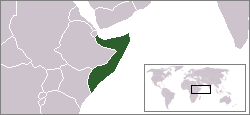LGBT rights in Somalia
From Wikipedia, the free encyclopedia
| LGBT rights in Somalia | |
|---|---|
 Somalia |
|
| Same-sex sexual activity legal? | May vary by region, some regions apply Islamic Sharia law (see below) |
|
Penalty:
|
May vary by region, death penalty for men and women in Sharia areas (see below) |
| Gender identity/expression | - |
| Recognition of relationships |
No recognition of same-sex relationships |
| Adoption | - |
| Military service | - |
| Discrimination protections | None |
As of 2009, Somalia is in a state of severe internal chaos and violence. The National Government has largely avoided the issue of lesbian, gay, bisexual, transgender (LGBT) rights, with the matter be settled by the local governments and militias.
Contents |
[edit] Situation by region
[edit] Transitional National Government
Since its creation in 2000, the Transitional National Government has avoided most matters concerning human rights. As of 2009, there is no national constitution or legal system and the political parties who participate in the national parliament do not support LGBT rights.
[edit] Puntland
The State of Puntland appears to be using the original Somali code, a combination of British colonialism and Islamic law. As such, homosexuality is a crime under both the penal code and the prevailing social mores derived from Islam.[1]
In 2001, a lesbian couple was reportedly tried and sentenced to death for their "unnatural" sexual relationship, but the Puntland government denied that the incident took place.[2]
Its transitional constitution stipulates that Islamic law shall be one of the legal foundations of the state and the only religion that may be promoted.[3] Among its other relevant provisions are:
- Section 3. Article 17. Protection of the Family - Promise to defend the family, defined as a union between a man and a woman.
- Article 32. Personal freedom shall be limited by, among other things, Islam and morality.
[edit] Somaliland
The state of Somaliland apparently decided to retain the original Somalia criminal code, with some revisions. Hence, homosexuality is likely illegal in Somaliland under the same provisions as is the case in Puntland.[4]
The Press/Media Law of 2007 requires the Somaliland support good Islamic morality and not endorse immorality or corrupting practices.[5]
Several parts of its Constitution may impact LGBT rights.[6]
- Article 5 - Islam is the official religion, the basis for all laws and no other faith may be promoted. The Government is charged with fighting immorality and promoting Islamic law.
- Article 8 - Equal rights regardless of, "colour, clan, birth, language, gender, property, status, opinion etc."
- Article 16 - Promotion of Arts and Culture that respect Islam and modesty.
[edit] LGBT rights leglisation
No national law exists, so there are no anti-discrimination laws, hate crime laws, or national family law. As of 2009, no Somali State or region has enacted such laws. No political party has called for such laws to be enacted. No Somali region recognizes a same-sex marriage or civil union.
[edit] Gender identity/expression
Little is known about the issue of gender identity in Somali. Prior to the outbreak of the civil war, some reports have suggested that in the City of Mogadishu, male homosexuality was tolerated as long as the men dressed up as women in public.[7] Yet, a more recent reported stated that a man was arrested by local police in for cross-dressing.[8]
[edit] Living conditions
Reports suggest that LGBT Somalis are typically pressured to conceal their orientation and, upon parental approval, marry someone of the opposite sex. People who are believed to be LGBT may become the victims of an honor killing.
The largely Islamic Somali government has not formally criminalized Homosexuality, but allows state governments to decide whether to punish LGBT persons. LGBT persons who are arrested face Sharia courts. The penalty for Homosexuality in Sharia areas is typically death, but it can vary.
[edit] HIV/AIDS
Family planning services are hard to access as is fact based information on human sexuality. Humanitarian workers have stated that Islamic social mores often make it difficult to publicly talk about how the virus can be spread.[9]
Since 1999 most of the AIDS/HIV eduction and care comes from international organizations such as United Nations.[10]
Despite the apparent lack of information regarding HIV/AIDS, only 0.5% of the population have been infected by the virus.[11]
[edit] LGBT organizations
In 2004, one group reportedly existed for LGBT Somalis.[12] It cannot lobby the national government, which barely exists, and regional government is essentially in the hands of Islamic fundamentalists, pirates and other violent gangs.
In 2005 a group of LGBT Somalis living in the United Kingdom was formed.
[edit] See also
[edit] References
- ^ http://www.sodomylaws.org/
- ^ http://www.sodomylaws.org/
- ^ http://www.puntlandgovt.com/constitution.php
- ^ http://www.somalilandlaw.com/Criminal_Law/body_criminal_law.html
- ^ http://www.somalilandlaw.com/Somaliland_Press___Publications_Bill_English.pdf
- ^ http://somalilandforum.org/sl/2002/01/01/somaliland-constitution-laws/
- ^ http://www.afrol.com/features/10599
- ^ http://www.somalilife.com/vbforum/showthread.php?t=32011
- ^ http://data.unaids.org/pub/Report/2008/somalia_2008_country_progress_report_en.pdf
- ^ http://data.unaids.org/pub/Report/2008/somalia_2008_country_progress_report_en.pdf
- ^ http://data.unaids.org/pub/GlobalReport/2008/GR08_2007_HIVPrevWallMap_GR08_en.jpg
- ^ http://www.sodomylaws.org/world/somalia/sonews007.htm]
[edit] External links
| This article about lesbian, gay, bisexual, or transgender-related law is a stub. You can help Wikipedia by expanding it. |
| This Somalia-related article is a stub. You can help Wikipedia by expanding it. |